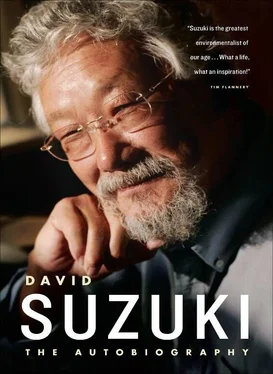I concluded that I wanted to participate in the debate about the implications of genetic work and that if I did, I could not also be involved in research using the revolutionary techniques. I continued:
Can the important questions be addressed objectively when one has such high stakes in continuing the work? I doubt it. Therefore I feel compelled to take the position that. . no such experiments [on recombinant DNA] will be done in my lab; reports of such experiments will not acknowledge support by money from my grants; and I will not knowingly be listed as an author of a paper involving recombinant DNA.
As a geneticist, I believe there will be monumental discoveries and applications to come. But I also know that it is far too early and that the driving force behind the explosion in biotechnology is money. I graduated as a fully licensed geneticist in 1961 and was arrogant, ambitious, and filled with a desire to make my name. We knew about DNA, and the genetic code was just breaking; it was a delirious moment in science and we were hot. But today when I tell students about the hottest molecular ideas in 1961, they laugh in disbelief because forty years later, those ideas seem ridiculously far from the mark.
Those same students seem shocked when I suggest that when they are professors twenty years from now, today's hottest ideas will seem just as far off the mark. The nature of any cutting-edge science is that most of our current ideas are wrong. That's not a denigration of science; it is the way science progresses. In a new area, we make a number of observations that we try to “make sense of” by setting up a hypothesis. The value of the hypothesis is not only that it provides a way of thinking about the observations but also that it allows one to make a critical test by experiments. When the experiments are complete and the data in, chances are we will throw out the hypothesis or radically modify it, then do another test. That's how science progresses in any revolutionary area, which is what biotechnology is. It becomes downright dangerous, then, if we rush to apply every incremental insight or technique within a theoretical framework that is probably wrong.
Geneticists involved in biotechnology make breathtakingly simple mistakes and assumptions. With the power to isolate, sequence, synthesize, and manipulate pieces of DNA, it is easy to conceive of all kinds of novel creations — bacteria that will spread through our bodies to scavenge mercury or other pollutants and then extrude them from a pimple, plants that photosynthesize under much lower light intensities or at twice the rate, plant crops that can live on highly salinated soil or fertilize themselves from air, and so on. Even though these are just pie-in-the-sky speculation, companies are often set up on such ideas. But if such notions are considered real possibilities, transfer of sterility genes to wild plants, genetically engineered fish that destroy ecosystems, and new deadly diseases are every bit as plausible. We just don't know.
Biotechnologists generally deal with a characteristic they want to transfer from one organism to another — for example, a product that behaves as an antifreeze in flounders that enables the fish to live at temperatures below freezing. The DNA specifying the antifreeze substance is isolated and then transferred, say to a strawberry plant, on the assumption that in that totally new environment, the DNA will function just as it did in the fish. But natural selection acts on the sum total of the expression of all of the genes in the cascade of reactions that occurs from fertilization to development of the whole organism. The entire genome is an entity selected to function in the proper sequence. When a flounder gene is inserted into a strawberry plant, the fish DNA finds itself in a completely alien context, and the scientist has no idea whether or how that gene will express itself in the new surroundings. It is like pulling rock star Bono out of his group u2, sticking him into the New York Philharmonic Orchestra, and asking him to make music in that setting. Noise might emerge, but we can't predict what it will sound like.
It is far too early to begin to create products for food or medicines or to grow them in open fields at this stage in biotechnology's evolution if we wish to avoid unexpected and unpredictable consequences. But because the driving force to get novel organisms out is money, when I say such things I am confronted with angry biotechnologists demanding to know when we will ever know that a genetically engineered product is ready to be consumed or grown in the open.
My response is that when a field of experimentation is immature, virtually every bit of research yields a surprise and ultimately a publication; last time I looked, there was a profusion not only of articles but of biotechnology journals. The science is in its infancy. When it has reached a point where an exact sequence of DNA can be synthesized or isolated and inserted at a specific sequence in a recipient's DNA and the resultant phenotype predicted beforehand with absolute accuracy and replicability, then the science is mature enough to proceed to the next stages of wider testing. We're a long way from that. The science is exciting, but the applications are frightening in view of our ignorance.
I deliberately stopped research but did not immediately lose all of the knowledge that made me a geneticist. I am proud of my career and contribution in the field, yet the minute I ceased doing research and began to speak out about the unseemly haste with which scientists were rushing to exploit their work, people in biotechnology lashed out as if somehow I no longer understood what is being done.
It is young people, relatively unencumbered by distractions like administration and teaching, who are able to expend the energy to do research. As scientists get older, they acquire layers of responsibility that take them away from the bench. There is always the pull to keep publishing to validate their standing as scientists. It is unfortunate that older scientists aren't afforded recognition and respect for their past achievements and acknowledged as elder statespeople who can afford to look at the broader picture.
THE POWER OF SCIENCE is in description, teasing out bits of nature's secrets. Each insight or discovery reveals further layers of complexity and interconnections. Our models are of necessity absurdly simple, often grotesque caricatures of the real world. But they are our best tool when we try to “manage” our surroundings. In most areas, such as fisheries, forestry, and climate, our goal should be simply to guide human activity. Instead of trying to bludgeon nature into submission by the brute-force applications of our insights (if planted, seedlings will grow into trees; insecticides kill insects), we would do better to acknowledge the 3.8 billion years over which life has evolved its secrets. Rather than overwhelming nature, we could try to emulate what we see, and that “biomimicry” should be our guiding principle.
But even reductionism — focusing on parts of nature — can provide stunning insights into the elegance and interconnectedness of nature, and reveal the flaws in the way we try to manage her.
A good illustration of both the strengths and weaknesses of science and its application is the temperate rain forest of North America. Pinched between the Pacific Ocean and the coastal mountain range, this rare ecosystem extends from Alaska to northern California. Around the world, temperate rain forests are a tiny part of the terrestrial portion of the planet, yet they support the highest biomass of any ecosystem on Earth. That's because there are large trees like Sitka spruce, Douglas fir, red and yellow cedar, hemlock, and balsam. But the heavy rains wash nutrients from the soil, making it nitrogen poor. How, then, can it support the immense trees that characterize the forest? For several years, the David Suzuki Foundation funded studies to answer this question by ecologist Tom Reimchen of the University of Victoria.
Читать дальше


![David Jagusson - Devot & Anal [Hardcore BDSM]](/books/485905/david-jagusson-devot-anal-hardcore-bdsm-thumb.webp)









